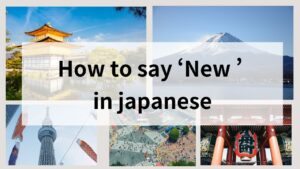Are you curious about how to say “one” in Japanese? The number one is fundamental in any language and plays a significant role in counting, expressions, and cultural nuances. This guide will explore the Japanese word for “one,” its cultural significance, and practical applications.
How Do You Say “One” in Japanese?
The Japanese word for “one” is 一 (ichi). This term is widely recognized and used in both casual and formal contexts. The number one serves as the foundation for counting in Japanese and appears in various phrases and expressions.
The Japanese Word for One: Ichi (一)
“Ichi” is the term used to describe the number one. It can be seen in various phrases and contexts. For example:
- 一つ (Hitotsu): “One (thing).” This is used for counting objects.
- 一番 (Ichiban): “Number one” or “the best.” It is often used to denote the first in rank or preference.
- 一緒 (Issho): “Together” or “with one.” This term emphasizes unity.
Kanji for One: 一
The kanji for one, 一, is visually simple yet powerful. It represents the concept of singularity and wholeness. The primary reading for this kanji is いち (Ichi), but it can also be pronounced as ひと (Hito)
Examples of words containing the kanji 一 include: This kanji is commonly associated with concepts of unity, beginning, and simplicity. Recognizing these patterns can help learners understand the nuanced use of 一 in Japanese. The English word “one” is generally understood in Japan, especially among younger generations or those familiar with English. However, its recognition might vary among older individuals or in more traditional contexts. A 5-point scale rates its comprehension as: If clarity is crucial, using the Japanese term いち (Ichi) is recommended. While “one” may be understood in certain contexts, “ichi” ensures effective communication. The number one holds a special place in Japanese culture, symbolizing beginnings, unity, and individuality. In various aspects of life, from traditional arts to modern expressions, “one” signifies the essence of singularity. In Japanese culture, the concept of “one” often reflects harmony and togetherness. This idea is deeply rooted in social structures and relationships, emphasizing the importance of collective unity. The number one appears in various Japanese myths and stories, often representing the beginning of creation or the first of something significant. It symbolizes the idea that all things start from one, establishing a connection to nature and the universe. In addition to its traditional associations, the concept of “one” plays a significant role in modern Japanese pop culture, particularly in music and entertainment, showcasing the importance of individuality and personal expression. These examples demonstrate how the concept of “one” continues to represent unity, aspiration, and the importance of beginnings, bridging traditional beliefs and modern storytelling. There can be subtle differences in how “one” is perceived in Japan versus Western cultures. In Japan, “ichi” (一) often emphasizes simplicity and unity, while in Western contexts, “one” may include a broader range of meanings, including individuality and competition. Understanding these cultural nuances can help avoid confusion, especially when discussing concepts of success or achievement. Learning how “one” is used in Japanese can help you navigate conversations, understand idioms, and recognize its presence in Japanese culture. Here are some examples of how “ichi” is used in everyday conversation: While there are relatively few specific idioms involving “ichi,” the number is often associated with beginnings and firsts in Japanese culture. Here are some idioms, phrases, and expressions that incorporate or symbolize “one”: These idioms and expressions reflect the deep cultural appreciation of the number one in Japan, often tied to themes of unity, beginnings, and love. By learning these phrases, you can gain a deeper understanding of how “one” is interwoven with Japanese language and values. The concept of “one” is also prominently featured in Japanese cuisine and products, showcasing its significance in serving and presentation. Here are some notable examples: These examples highlight how the number one is not only a numerical value but also culturally significant in Japanese cuisine, emphasizing quality, simplicity, and unity. Here are some frequently asked questions about “one” in Japanese culture and language. Yes, one is a popular number in Japan, often associated with beginnings and unity. It is frequently used in various aspects of life, including social interactions and cultural expressions. The word “one” can be written in three different scripts in Japanese: hiragana, katakana, and kanji. Each script serves different purposes depending on the context and formality. Here’s a breakdown: Choosing which script to use depends on the tone, audience, and purpose of your communication. Understanding these variations can enhance both your written and spoken Japanese skills. The number “one,” or “ichi” in Japanese, is more than just a numeral—it symbolizes beginnings, unity, and cultural significance. By understanding its role in Japanese language and traditions, you can deepen your appreciation for this fundamental number and its place in Japanese society.
Does “One” Work in Japanese?
The Cultural Significance of One in Japan
One as a Symbol of Unity
One in Japanese Folklore and Mythology
Differences Between One in Japan and Overseas
Practical Applications of “One” in Japanese
Talking About One in Daily Conversation
One-Related Idioms or Expressions
One in Japanese Cuisine or Products
FAQs
Is One a Popular Number in Japan?
How Do You Write “One” in Japanese?
Hiragana is the most commonly used script for “one” in casual writing or when teaching children. It is simple and easy to read, making it ideal for everyday use.
Katakana is rarely used for “one,” but it may appear in stylistic contexts, such as advertisements or product names, where emphasis is needed.
Kanji is the most formal and traditional way to write “one.” It is often used in literature, official documents, and cultural contexts. The kanji itself conveys a sense of simplicity and significance.Conclusion








